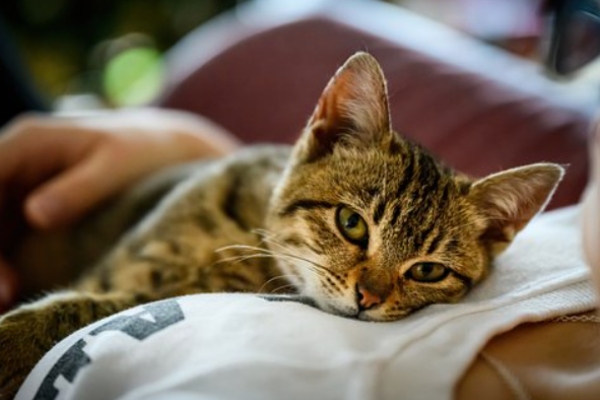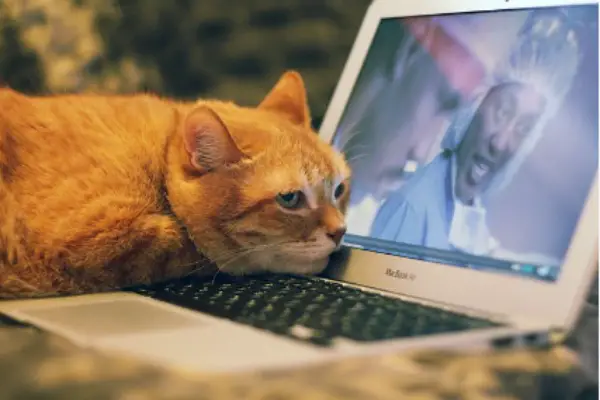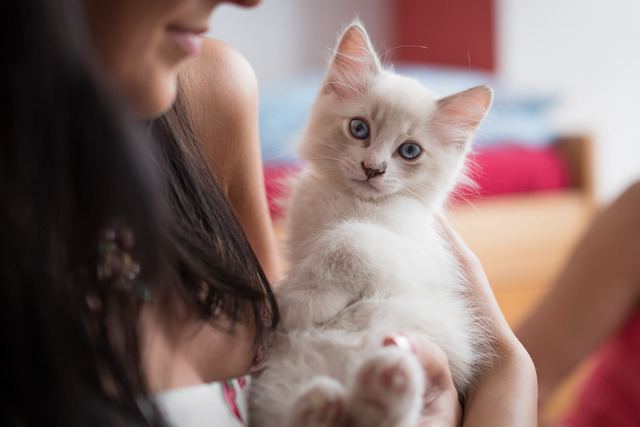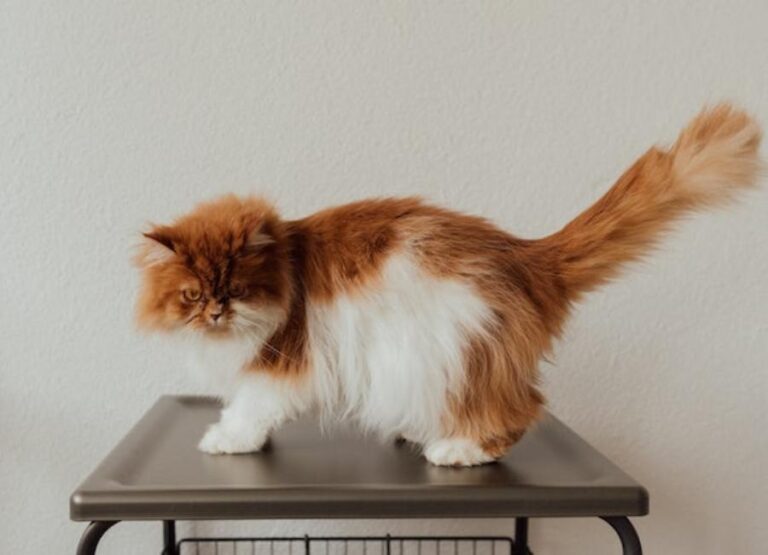How To Comfort a Dying Cat: 16 Helpful Tips

It’s always hard to deal with the loss of your cat, so let’s discuss how to comfort a dying cat and make their last days easier for them.
Make the most of your time with your cat when she is dying by keeping her as comfortable as possible.
Instead of being sorry about what you know will happen, use this time to bond with your cat and remind the dying cat how much you love them.
Keep reading to find out how to comfort your dying cat.
How To Comfort a Dying Cat
A dying cat’s motor abilities, in addition to its eyesight, may deteriorate when they are dying.
This implies you should keep their food and water close to where they sleep.
Some typical methods for calming and caring for a dying cat are as follows:
1. Adjust to a calm environment immediately
Your cat will want to be as comfortable as possible when his or her health deteriorates.
Unfortunately, it will eventually reach a point where it is unable to assert itself.
It will no longer be able to seek out the coziest hiding spots or snooze in the hottest lairs at this stage. It could not even be able to move around much.
To help them feel more at peace, place their favorite toys beside them.
Relocate their sleeping quarters to a quiet area of the house to keep them away from the noise and bustle of everyday life and to allow them to relax as much as possible.
You should provide a calm spot for your dying cat, things like loud sounds should be kept away from your dying cat.
Read more: 14 Most Common Cat Sick Symptoms & Care Tips.
2. Talk to your cat with a quiet and soothing tone
When consoling your dying cat, use a mild, soothing tone. These tones will elicit feelings of love and compassion.
To persuade the ill cat-lover that everything is fine, call him names and other things you’d use for positive reinforcement.
By speaking in calm, soothing tones and giving your cat plenty of soft strokes, you may reassure him that he isn’t alone.
Sleep in a sleeping bed next to his bed at night if you want to be sure you’re always there for him.
3. Keep your dying cat warm
For guidance on the finest soft bed to buy for your dying cat, see a veterinarian. In addition, you offer blankets for your dying cat.
Use the blanket to keep your dying cat warm if he is cold or has trouble managing his body temperature.
Because elderly, dying cats are more prone to pressure sores, give more padding to keep them comfortable.
Choose a spot that is simple to clean, as well as bedding that can be washed after an accident.
If your dying cat is cold, keep him warm by putting a heater in the room if necessary.
4. Spend more time with your dying cat
Cats benefit from human connection, especially when they are dying.
Even if they aren’t dying, you can take advantage of this. More time spent with your dying cat will make them feel better.
Try to spend more time with your dying cat than usual so that they will feel cherished at the end of their lives.
When spending additional time with your dying cat, keep in mind that disturbing them may induce stress.
5. Make sure your dying cat stay hydrated
Dehydration in a dying cat is concerning, so have your cat inspected by a veterinarian.
If you suspect your dying cat is thirsty, give him some water, or encourage your pet to drink water to avoid chronic dehydration.
If he takes them, keep an eye on him for signs of dehydration. If he can’t keep fluids down, get medical help right away.
To avoid organ damage, your dying cat may require intravenous hydration treatment.
Keep a bowl of water near your dying cat and make sure he drinks as much as he can to avoid dehydration.
6. Provide smaller meals at regular intervals
Make a small amount of your dying cat’s favorite food and feed it to him on a regular basis.
If your dying cat becomes hungry, make sure you have some of his favorite foods on hand.
If your dying cat isn’t hungry, don’t force him to eat.
Solid food may irritate your dying cat’s stomach, causing digestive processes to stop down.
If your dying cat still wants to eat but can’t because of an upset stomach, combine food and water for him.
7. Avoid harsh light over your cat sleeping spot
This is one of the most crucial things you can do for your dying cat to keep him from becoming anxious.
Harsh lighting in your dying cat’s sleeping nook or area will simply add to his or her stress.
Changing the lighting in your cat’s habitat might help her feel more at ease.
Open the window drapes or blinds just enough during the day to bring in diffuse, natural light. When the sun sets, give gentle lighting for your cat.
When it’s time to say goodnight to your cat, turn on a dim light. She could prefer dim lighting to utter darkness.
8. Help your dying cat stay clean
Urine or excrement from your dying cat is possible, so help your dying cat stay clean as much as possible.
Not only will urine or excrement bother him, but the urine may also burn his skin.
Wipe the fur clean with a clean towel soaked in clean water, replenishing and cleaning it as needed.
Apply a coating of petroleum jelly to his belly skin and clean it often if he’s dribbling pee all the time.
Remember to change kitten pads when they become filthy.
Keep his eyes clean and clear of discharge with moist cotton wool balls, and make sure your dying cat is comfortable.
9. Assist your dying cat with grooming
When your cat is dying, he is unlikely to brush himself on a regular basis, so assist him if required.
Cats who are dying lose their capacity to groom and clean their fur.
While a bath is probably too much for your pet, a daily brush may help eliminate mats and knots and make it feel more at ease.
If your cat is in pain, be kind and focus on the areas that are causing discomfort.
10. Make your dying cat food easy to eat
When your cat is dying, they may not only lose their appetite, but they may also lose the physical capacity to chew her food properly.
As a result, you’ll need to make her cuisine more approachable. You may soften dry foods by soaking them in water or mashing them.
You can ground dry food in a blender instead of mashing it, and if you’re giving your cat baby food, you can add some water to make it even softer.
If you’re unclear what foods your cat can and would like to consume near the end of her life, see your veterinarian.
11. Carefully approach your dying cat with caution
Make sure you don’t startle your dying cat when he is resting.
Approach him softly and carefully touch your dying cat to avoid his becoming shocked.
Always avoid surprising your dying cat for any reason since it may make them angry.
Before approaching your dying cat, make sure he is aware that you want to pet or approach him.
12. Don’t shout at your dying cat for any reason
When your cat is dying, they may feel scared and vulnerable, and they may need comfort from you that everything will be well and that you will look after them.
Speak to them in a loving, soothing tone to help them relax and feel as though you are by them while they are in agony.
Tell them you care about them and that you love them; even if they don’t comprehend what you’re saying, they will pick up on your tone.
Never use a harsh tone while dealing with a dying cat since this will just make him or her more stressed.
13.Pet your dying cat to take drugs
Don’t be harsh with your dying cat if he’s not taking drugs always call him sweet names and pet him to take his drugs.
You’ll need to keep an eye on them and follow their veterinarian’s advice for managing their symptoms.
If your veterinarian prescribes pain medicine for your dying cat, carefully follow the instructions.
If this is the case, give them their medicine on a regular basis to keep them comfortable and pain-free.
Make certain you remember to give your dying cat his or her medication.
Read more: 14 Most Common Cat Anxiety Symptoms Explained.
14. Keep track of your cat body temperature
If your cat is drying don’t just let him be alone, stay close and keep track of his body temperature to know the direction of things.
Fever and overheating are common symptoms in cats that are sick and near death.
A dying cat will need your aid to cool down since it can’t control its body temperature as efficiently as it should.
Keep your cat cool and dry if he has any indications of illness or dying cats symptoms.
To keep your cat cool, put him in an air-conditioned room or under a fan.
Your cat will also benefit from chilled water and ice cubes.
15. Avoid new activities around your cat
Avoiding any type of movement or physical activity around your dying cat is one approach to ensure that it is comfortable.
When cats are dying, they lose a lot of energy, and any type of exercise will just add to their anguish.
As a result, when your cat is dying, keep him away from new hobbies or workouts.
16. Always remain calm and patient
Most cats are highly sensitive to your emotions, so expressing rage or irritation about something over which they have no influence might be alarming.
If your dying cat is cranky or irritated due to illness, please be patient and give any additional comforts you can at home.
If their lack of bowel control is becoming too much for you to handle, consider putting them in pet diapers.
Joint and muscle illnesses are frequent in older cats that are dying, and they may be concerned by their discomfort and limitations.
Always remain calm and patient with your dying cat.
Discuss euthanasia with your Veterinarian
Discuss euthanasia with your veterinarian.
While you’re trying to make the most of the time you have left with your ailing cat, you’ll also have to prepare for her death.
This is not an easy task, but it is one that you must do.
Speaking with your veterinarian will assist you in managing and organizing this challenging process.
Euthanasia is a painless and compassionate option to put your pet to sleep.
Your veterinarian would provide an anesthetic medicine to your dying cat to execute euthanasia.
Your cat would go blissfully into oblivion after a few seconds and finally stop breathing.
How to get over the loss of your cat
Make arrangements for the disposal of your cat’s remains.
As if deciding to euthanize your cat wasn’t difficult enough, you now have to consider what to do with his or her remains.
You may either bury your cat in a pet cemetery or have her cremated.
Do not feel compelled to pick one choice over the other; instead, choose the one that best suits your needs.
Pet cremation and burial options are available through your veterinarian.
Here are some common ways to get over the loss of your cat:
- Seek support from other cat or pet owners.
- Recognize and accept the reality of your cat’s passing away.
- Don’t rush to replace your dead cat.
- Do your best to embrace the pain of the loss.
- Allow yourself to grieve over the loss of your cat.
- Never blame yourself for the loss of your cat if you did your best.
- Talk to your children or friends about what happened.
- Give yourself time to heal from your loss.
- Schedule a fun activity to help clear your mind.
- Get plenty of rest and sleep after your cat pass away.
- Don’t be afraid to seek professional help if needed.
- Finally, adopt a new cat in need and move on.






